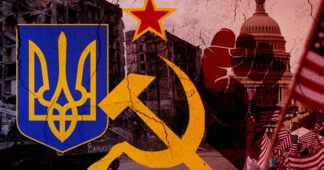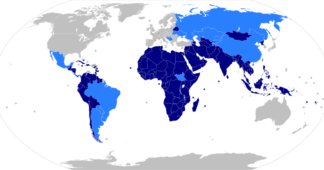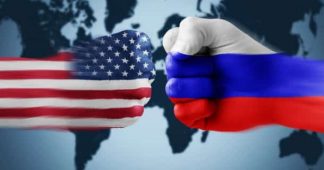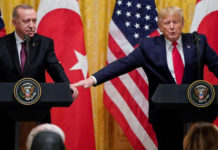By Dimitris Konstantakopoulos (*)
I believe the demand for multipolarity is the most fundamental and the most genuinely democratic demand of our times.
I am very happy because I belong to the very few people who struggled for the advent of multipolarity since 30 years now. We organized already two big international conferences in Athens in 1993 and 1995 against George Bush’s “new world order”, asking for the lifting of sanctions to Serbia, Iraq, Libya and Cuba. People of very different ideological orientations like Michel Pablo, the former Secretary of the 4th International, Yegor Ligachev, the No2 in the CPSU and Ramsey Clark, the former US Attorney General of the USA had participated in them and had agreed on the imperative need to create a counter – balance to unipolarity. Many years later, when we were drafting a call which would become the manifesto of the European Radical Left during the European debt crisis (before it was betrayed), we did speak again of the need of a “multipolar” Europe (https://www.defenddemocracy.press/common-appeal-for-the-rescue-of-the-peoples-of-europe/ ).
Today and this is the reason I am very happy, what was the quest of a handful of people, back in the 90s, has become a demand of a large part of humanity.
During the last three decades we have seen beyond any doubt what means a unipolar world, namely the course towards a totalitarian global dictatorship of the international Financial Capital, the United States and the “collective West”, a situation predicted by Karl Marx in his Grundrisse (and, to some degree, corresponding to the notion of Super-Imperialism proposed by Karl Kautsky).
We have seen what unipolarity means in the demolition of the welfare state and of any notion of independence and sovereignty in the former “socialist” countries, as a result of the restoration of capitalism there.
We have seen it in the brutality unleashed by NATO armies in Yugoslavia, the wider Middle East, parts of Africa, or by the Israelis in Palestine and Lebanon, after the soviet collapse. After 1991, a vast area of the world was simply turned into ruins.
We have seen it in the systematic destruction of the welfare state in the West itself, starting with the “demolition” of Greece using financial, political and ideological “weapons”, after 2010, by what has been and still is a pilot – program for the destruction of the “nation – state” or, to be more precise, of its functions of social and national protection and any democratic elements included in it.
We have also seen it in the general advances of post-modern totalitarianism in the West (and also to the simultaneous reappearance of some more “traditional” forms of the Far Right).
We have seen it in the aggravation of all the other problems of the planet, our common home and in the remarkable increase of the probability of a nuclear or ecological annihilation of humanity. We have seen it also in the explosion of inequalities, both inside and between countries.
This is why I consider so positive what many observers, including a few ones inside the western elites themselves, are now becoming more and more certain of: The United States and the “Collective West”, instrument par excellence of the Empire of Finance, do not have any more the means, they cannot impose their domination on the planet. If they had such a possibility, they have it no more. The economic rise of a non-capitalist country like China and of other economic forces of the South, the military return of Russia, the constant and heroic resistance of the Serbs and of the peoples of the Arab and Muslim world, of the Iraqis, of the Hezbollah, of the Palestinians, of the peoples of Yemen, of Syria, of Afghanistan, among others have denied to Imperialism the opportunity to impose its power on the planet. The struggles of the working and popular classes of the West itself are also an obstacle to the drive of capitalist elites towards world domination, although, unfortunately, the reach of these struggles is limited, for the time being, by the corruption of the political and trade union leaders of those classes and their identification with Imperialism and by the massive pro-imperialist propaganda and the unprecedented control of nearly all media outlets and the “intellectual” class, exercised now for some decades already.
The objective lack of the possibility for global capitalism to impose its domination on the planet is the necessary – although not yet sufficient – condition to going to a situation of multipolarity. On the other hand, multipolarity seems now a necessary transitional stage if we are to go to the direction of a deeply democratic world, a world that would reduce inequalities, both within countries and between them, put productive forces and technology at the service of man and lead us to a civilization of harmonious coexistence with nature: what Hugo Chavez called socialism of the 21st Century.
It is important to underline the dialectic connection between the struggle against a western dictatorship on the world, against “unipolarity” and for “multipolarity” with the struggle for a new superior human civilization.
Firstly, because we don’t have just unipolarity – the quest of the USA and the big Financial Capital to dominate the world – to deal with. We also need a new culture to address the enormous problems of our world: indeed, we need a new civilization which will change the structure of consumption from individual to collective; which will place under public and international control the terrible technologies being developed now, technologies which will determine the very future of humankind, even our very survival as a species. Such technologies cannot remain under the control of very limited minorities of wealth and power without significant risks. We need an in-depth democratization of our societies, not in the sense of introducing and imitating a Western, to a large extent, pseudo-democracy, but in the sense of a real participation of workers and citizens, if possible, in all the decisions that concern them, with a system of generalized self-management at all levels, and social ownership and management at least of the greatest productive forces. Strategically, we don’t need a system of over-concentrated power (a dictatorship of the few) but a society of diffused intelligence, able to advance collectively towards a superior form of civilization and permitting what Marx called the transition from pre-history to history of humanity.
Some people will say that all that seem very “utopian” not realistic, as goals, especially in the light of the collapse of Soviet “socialism”. First of all this “Socialism” was not so much a “socialism”. At best it was a first step to the direction of such a society. Second, it is even more unrealistic and utopian to believe humanity is viable, sustainable, with its present modes of organization and dominant ideas.
We need and we will need still for a long period a system of market mechanisms but we need also – and the energy crisis is an obvious example of this necessity – a system of planning the economy on the national, regional and global level – because to let the running of the national and the world economies to the (not so) blind “market forces” is tantamount to going head on to multiple global disasters. A situation where a handful of individuals, owners and managers of a few financial funds and multinationals will develop more and more the capacity to control the human DNA, the genome of plants and animals, the human mind and body, the chemical environment and the climate of the Earth and to be able to decide the future of humanity and even its survival or not is not acceptable and it will lead almost certainly to disaster.
As I said before unipolarity has already been defeated and continues to be defeated every day. But this is the necessary, not the sufficient condition if we are to move to a better world. First, as I said already, we have to address also the problems described. We need also to do it also for another reason. The collective West may not have the means to impose its dictatorship to the planet, but it has the means to destroy humanity in its effort not to lose its domination. And it is foolish to bet on the pseudo-rationality of capitalism to save us from this possibility.
By developing a more general vision, encompassing the needs not only of the East and of the South, but also of the western popular classes, we can hope to find allies inside the western “camp” itself. And the emergence of such allies is of strategic importance if we are to avoid the sliding of the collective West into a more totalitarian structure, able to be led to global disaster by the “Party of War”, the “Black International” inside the West.
Unfortunately, even our own minds are not up to speed with reality. We are still thinking often in terms of past human history, including WWI and WWII. But after 1945 there is simply no possibility of winning a world war, but there is the possibility of eliminating all life from the face of the Earth. After 1960, a new question is also put objectively in front of humanity. Humanity must continue the development of its productive forces and, if so, which productive forces?
We have entered a radically different era of human history. Our political thinking must take into account the above factors and also the fact that we have reached and have probably exceeded the physical limits of the planet. We are polluting the environment and destroying the Earth’s climate at great speed, in an irreversible way, thus putting the very survival of higher forms of life on Earth at imminent risk.
The resistance of the East and of the South to the criminal collective imperialism of the West is the necessary condition for safeguarding human civilization and a future for humanity. No doubt about it. But in the same time and even if we avoid the danger of nuclear arms and other means of mass destruction, the East-West and West-South conflicts, if they are prolonged indefinitely without a decisive issue, will most probably lead to an ecological disaster, if not a Climate Holocaust. And unfortunately, very few people, even among us, understand that.
The West can no more win over the East or the South. But the East and the South cannot also win over the West. This is what makes critically important for saving humanity the emergence of popular movements inside the western world itself. Unfortunately various subjective and objective forces are working against such an emergence. Imperialism itself makes everything possible to impede the emergence of such movements, by promoting either the pro-US: Pro-imperialist Soros-type pseudo-left (specialized in “human rights” but not on social and national ones), or forms of classic far right (promoted by the opposite wind of Imperialism, around Netanyahu). Those currents, the Soros post-modern pseudo-Left (following Fukuyama’s ideas) and the Far Right supported by the Netanyahu faction and following Huntington’s program of civilization wars, are using opposing methods and ideologies (quest of “happy globalization” for the first group, nationalism – of the oppressors, not of the oppressed – for the second) to achieve the same goal: safeguard the rule of Capitalism and the US on the planet. Those two currents seem at first hand to be contradictory. In fact they are complementary.
The resistance of Russia and China, of the resisting nations of the Arab and Muslim world, of Africa and Latin America is absolutely necessary to counter Western capitalist barbarism, but is not enough by itself to build a new democratic world order. For this we need an alliance of the oppressed nations (and classes) of the world (its East and its South) and of the oppressed classes (and even nations to some extent) of the West.
To confront the nuclear and ecological dangers of annihilation we need to not only resist Western imperialism, but to develop an alternative vision that will allow us to find also resonance in the Western World itself, in particular to its popular classes and its radical intellectuals, who are objectively the strategic allies of the East and the South and they must become also their conscious allies and vice – versa. Such an alliance and only such an alliance can lay the foundations of a radically different world order. On the contrary, to hope that the western far right can ever become an ally of the nations of the East and of the South because of its “anti-globalization” ideology, can prove to be a mistake more serious that the one made by Stalin on the eve of WWII.
But to do so we must remember that the problem is not globalization per se, as some people claim, it is capitalism and its offspring, imperialism. Globalization is but one form of capitalist domination. And being against globalization does not in itself mean being against capitalism and imperialism. As for unipolarity is not the product of some ideology or wish to dominate. It is the unavoidable generalization of the inherent tendency of Capital towards a continuously accelerated accumulation.
The confusion comes from the fact Big Capital, trying to homogenize the whole world under its domination, is attacking nations, states, religious or other identities, even the biological conception of gender. It is not doing that because of its “liberal” ideology – which by the way is not so liberal, it is neo-liberal, which is quite different already. It is doing that because nations, states, religions, ideologies, identities are all impediments to its domination.
We have to choose and the real dilemma is that either the 500 years era of Capitalism will come to a close, or the whole History of Man may end in a rather close future. This is the real question and we must have no illusions. As there was no “socialism in one country” there cannot be any “national”, “clean”, “uncorrupted” capitalism to return to from “globalization”. The only solution is to go forward to a deeply democratic, that is among others polycentric, social, ecological world order of cooperation.
This is why we need a new transitional program (if not the 5th International my friend Samir Amin was calling for), to describe how we will move from the present state of affairs to a different society nationally, regionally and globally: one expressing the deepest common historical interests of the peoples of the East, the West and the South. Such a program should include the demand for freedom and democracy – which must not be identified with the degenerate form of Western oligarchic parliamentarianism –, the social component, and the struggle against inequalities inside and between nations. It is time to introduce, along with market mechanisms, a huge dose of planning mechanisms, at the national, regional and international level and, also, a huge dose of participation mechanisms by producers of material and intellectual wealth and of control by consumers of material products and services (citizens). We must return to the Keynes’ idea that not only permanent deficits, but also permanent surpluses cannot be accepted. It is time to remember that the Soviet Federation was also a union of solidarity and of economic transfers from the richest to the poorest countries, something that the destructive egotism of Germans and Northern Europeans cannot accept for the EU – which, for this reason, is not and cannot become a real Union. And all of the above must be linked to the ecological demand, because if people don’t survive, there will be no purpose in politics and no politics.
I hope that the forces struggling for multipolarity will begin – in parallel with the ever so necessary and concerted action against imperialism – to work in a disciplined and serious manner for the elaboration of such a program for the salvation of mankind.
(*) This text is the speech of the writer to an international on-line conference on Multipolarity, held on April 29th, 2023
We remind our readers that publication of articles on our site does not mean that we agree with what is written. Our policy is to publish anything which we consider of interest, so as to assist our readers in forming their opinions. Sometimes we even publish articles with which we totally disagree, since we believe it is important for our readers to be informed on as wide a spectrum of views as possible.











